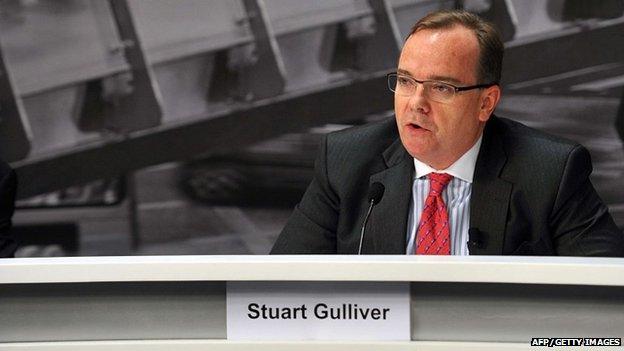HSBC's Gulliver steps back from London HQ decision
- Published
- comments

HSBC chief executive, Stuart Gulliver, warned earlier this year the bank could move its headquarters from London
Banking sources agree Budget has "softened" HSBC's attitude to staying in the UK - and it will be for the board to decide, not the CEO
For the City, one of the biggest events of the year will be HSBC's decision on whether it wants to change the location of its headquarters and leave London.
One very senior banking executive I spoke to yesterday said that he thought a move was very unlikely.
The political risk in Hong Kong - likely to be the leading alternative candidate for HSBC's new home - is just too high, the executive went on to argue.
And others very close to the bank agree that George Osborne's Budget announcement that the banking levy - which disproportionately affects HSBC - will be phased out has certainly "softened attitudes" to staying in Britain.
I have also gained some insight into how the process of making the decision on whether to stay or go will be made.
And it seems that Stuart Gulliver, the chief executive, has decided that the decision is not one for him alone.
At HSBC's results announced on May 5, Mr Gulliver said that the managers of the bank would look at the evidence and then make a recommendation to the board, backed by him directly.
That thinking has now changed.
It now appears that HSBC's management committee will compile a list of options which will then be put to the board with no preference expressed.
Positives and negatives for each option will be detailed.
Tipping the balance
What's important about the change is that it puts far more power in the hands of Douglas Flint, the bank's Scottish chairman, and far less power in the hands of Mr Gulliver, a fan of Asia who made his banking career in Hong Kong.
And as such, some might view the move as subtly tipping the balance in favour of London.
Each board member will have one vote. And Mr Flint will lead the discussion.
The decision will then be announced before the end of the year and put to investors.
The change of heart on the process came after the management committee realised that the issue was an incredibly complicated one.
And that a single recommendation from Mr Gulliver could be seen as unreasonably tying the hands of the board - particularly if the board did not agree, a situation that would put Mr Gulliver in a tricky position.
Decades long decision
Teams of external advisors and lawyers have already been hired by HSBC to interrogate the options. And I am told that London and Hong Kong won't be the only options in the "data pack" presented to the board.
Singapore and New York are also likely to be on the list.
One source told me that the bank was making a decision not for the next 3-5 years, but for the next two to three decades.
Many in the City believe that the political risk for HSBC in the UK has decreased just as the gyrations of the Chinese stock exchanges and the willingness of the Chinese government and central bank to intervene in markets has become all the more obvious.
Of course, there is still the small matter of the referendum on whether Britain remains within the European Union, an issue that weights heavy in HSBC's mind.
There is no done deal and HSBC insists that the bank is still months away from making a final decision. But, as far as many in the City are concerned, London has just edged ahead.